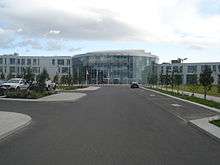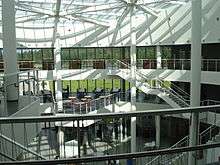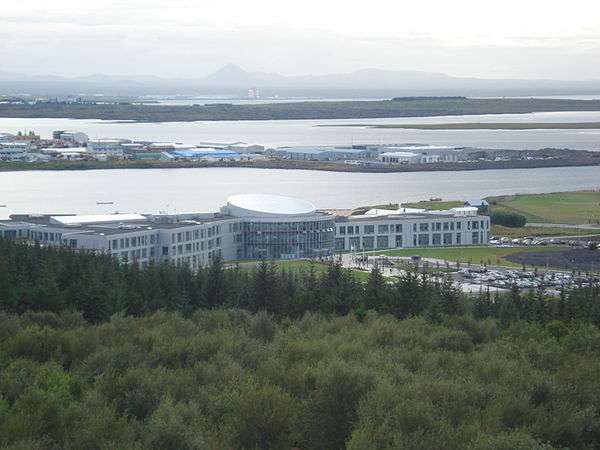Reykjavík University
| Háskólinn í Reykjavík | |
|
| |
| Type | Private |
|---|---|
| Established | 1998 |
| Rector | Ari Kristinn Jónsson |
Academic staff | 320 (part-time teachers 200) |
Administrative staff | 100 |
| Students | 3,200 (2012)[1][2] |
| Location | Reykjavík, Iceland |
| Campus | Urban |
| Colors | Red and White |
| Nickname | RU |
| Affiliations | EUA, AMBA |
| Website | http://www.ru.is/ |
|
| |
Reykjavík University (Icelandic: Háskólinn í Reykjavík), also known as RU, is the largest private university in Iceland with more than 3,500 students[1][2] and over 500 employees (professors come from over 26 countries).[3] It is chartered by the Chamber of Commerce, the Federation of Icelandic Industries, and the Confederation of Icelandic Employers.[4]
The university became fully bilingual (English and Icelandic) by the beginning of 2010, and it consists of four academic schools: School of Law, School of Business, School of Computer Science and the School of Science and Engineering.
The university's Executive MBA program was awarded 5-year accreditation by the London-based international accreditation organisation Association of MBAs (AMBA) in October 2011.
History
Reykjavík University has its roots in The Commercial College of Iceland, School of Computer Science (TVÍ), founded in January 1988 and run in The Commercial College of Iceland (VÍ) housing for ten years.
Reykjavík University started its first semester on September 1, 1998 in a new building under the name Reykjavík School of Business. TVÍ became one of two departments within the school. A name change was inevitable because the school's name was not descriptive for the variety of the school's operations.
In January 2000 the name was changed to Reykjavík University. In the autumn of 2002 the School of Law was established at Reykjavík University and in 2005 Reykjavík University was merged with the Technical University of Iceland (THÍ) under the name Reykjavík University. Following the merger, the School of Science and Engineering was established, partly built upon the old foundation of THÍ with the addition of new engineering fields.

Reykjavík University sponsoring the Icelandic Center for Research on Software Engineering (ICE-ROSE),[5] the Icelandic Center Of Excellence in Theoretical Computer Science (ICE-TCS),[6] the Icelandic Institute of Intelligent Machines (IIIM) and the Icelandic Society for Intelligence Research (ISIR).
Reykjavík University have opened the Center for Analysis and Design of Intelligent Agents (CADIA).[7] CADIA was founded by Kristinn R. Thórisson and Yngvi Björnsson, two professors at Reykjavík University, and it is the Iceland’s first AI research lab. Among others, during the years, CADIA has been collaborated with Honda on developing software for the ASIMO robot and with CCP Games on development of intelligent software for EVE Online. Moreover, CADIA has developed a General Game Playing (GGP) AI that won the World GGP Championship in 2007 and 2008. In 2009, CADIA has even received a prestigious European grant for the HUMANOBS project.[8] Finally, CADIA and IIIM together have sponsored an AUV (Autonomous Underwater Vehicle) developed by students of Reykjavík University. The AUV is called Freyja[9] and compete every year at the RoboSub[10] International Autonomous Underwater Vehicle Competition hosted by the Association for Unmanned Vehicle Systems International (AUVSI) and the Office of Naval Research (ONR) and took in San Diego, California.
From 2008, with the partnership of some computer security companies (e.g. Videntifier and Frisk) and of the Icelandic government, Reykjavík University have opened the The Laboratory for Dependable, Secure Systems (LDSS Lab).[11] The LDSS Lab was founded by Úlfar Erlingsson[12] and Ýmir Vigfússon and it conducts research and education to advance the state-of-the-art in the security and dependability of computer systems. In 2011, the LDSS Lab has been integrated into the SysLab (Systems and Security Laboratory),[13] that is now led by Ýmir Vigfússon.
Administration
Ari Kristinn Jónsson is the president of Reykjavik University, succeeding Svafa Grönfeldt in January 2010.
Schools and Offerings
The university features four schools:
- School of Business
- School of Computer Science
- School of Law
- School of Science and Engineering

In addition, Reykjavík University Executive Education for managers and business professionals. All the Schools offer a three-year study programme leading to a BSc or BA degree. In addition all four Schools offer Graduate programs including the Iceland School of Energy, an MSc program within the School of Science and Engineering offering two degrees in the field of sustainable energy science and engineering.
HMV is a programme that enables people to study and work full-time at the same time. Students in HMV are offered shorter diploma programmes as well as a BSc study. The School of Business and School of Computer Science offer HMV. In addition to the four schools Reykjavík University has an Open University that serves individuals and the business community with a range of courses.
Campus
Reykjavik University operates in Nauthólsvík in a new building that opened in January 2010. The structure of the building remember the sun with its rays that extend from its core, as a symbol of the culture that spreads in the same way.

Partner institutions
Reykjavík University partners with many universities and companies in areas of research and education. For instance, it offers a double degree in computer science together with the University of Camerino.[14] Students have the opportunity to enter exchange programmes through Nordplus and other partnership networks.
References
- 1 2 "Nýir útreikningar gagnast HR". RÚV. Retrieved 29 June 2015.
- 1 2 "Reykjavik University". Reykjavik University. Retrieved 29 June 2015.
- ↑ "Reykjavik University". Reykjavik University. Retrieved 29 June 2015.
- ↑ "Stjórnun og skipulag Háskólans í Reykjavík". Háskólinn í Reykjavík. Retrieved 29 June 2015.
- ↑ "ICE-ROSE – Icelandic Center for Research on Software Engineering". Reykjavik University. Retrieved 29 June 2015.
- ↑ "Icelandic Centre of Excellence in Theoretical Computer Science (ICE-TCS)". Retrieved 29 June 2015.
- ↑ "Center for Analysis & Design of Intelligent Agents - Reykjavik University". Retrieved 29 June 2015.
- ↑ Stefán Gunnarsson. "Land of Fire, Ice and Thinking Machines: The Recent Rise of AI in Iceland, and an Interview with the Thorisson Brothers who Helped Make it Happen - h+ Media". h+ Media. Retrieved 29 June 2015.
- ↑ "ruauv". ruauv. Retrieved 29 June 2015.
- ↑ "RoboSub". Retrieved 29 June 2015.
- ↑ LDSS Lab
- ↑ "Úlfar Erlingsson". Retrieved 29 June 2015.
- ↑ "start - syslab". 21 August 2013. Retrieved 29 June 2015.
- ↑ "Double Degree Programme Computer Science - RU and The University of Camerino". Reykjavik University. Retrieved 29 June 2015.
External links
- Reykjavík University - Official homepage
- Reykjavík University - English homepage
- Reykjavík University - Schools
- Center for Analysis and Design of Intelligent Agents (CADIA)
- Icelandic Center for Research on Software Engineering (ICE-ROSE)
- System and Security Lab (SysLab)
- The Laboratory for Dependable, Secure Systems (LDSS Lab)
- Icelandic Center Of Excellence in Theoretical Computer Science (ICE-TCS)
- Icelandic Institute For Intelligent Machines (IIIM)
- Icelandic Society for Intelligence Research (ISIR)
- Reykjavik University Autonomous Underwater Vehicle
- Reykjavik University's Students Association - Official homepage
Coordinates: 64°07′25″N 21°55′37″W / 64.12361°N 21.92694°W